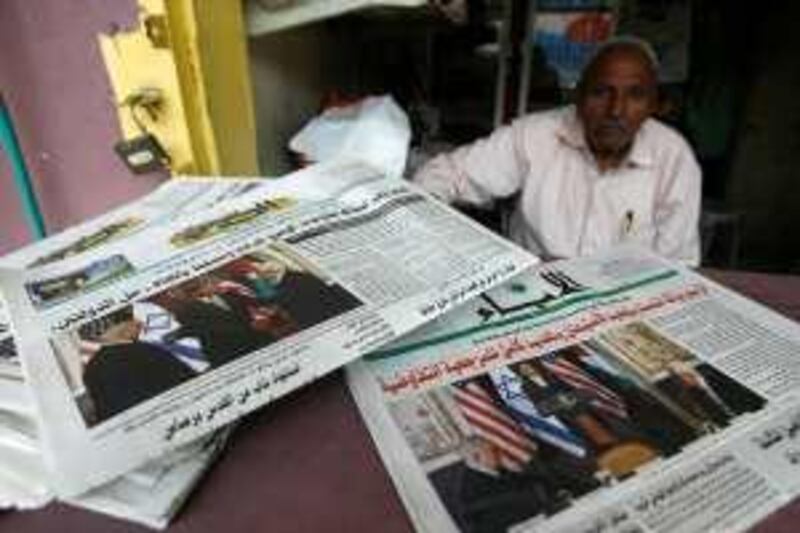TEL AVIV // While the long-awaited summit between US, Palestinian and Israeli leaders on Tuesday was greeted with great fanfare, it spurred few expectations yesterday of a renewed Middle East peace process. Dov Weisglass, a former negotiator under Ariel Sharon, the ex-Israeli prime minister, wrote in Yediot Ahronot, Israel's biggest newspaper, that both sides were hamstrung by their respective internal politics. He added: "The gaps between their positions are unbridgeable in the foreseeable future ? the one's maximum does not even come close to the other's minimum and vice versa."
Indeed, the reluctant handshake at the meeting in New York between Benjamin Netanyahu, the Israeli prime minister, and Mahmoud Abbas, the president of the western-backed Palestinian Authority, appeared to do little to bring the two sides closer to kick-starting talks. "It is difficult to be hopeful," said Ghassan Khatib, a former Palestinian cabinet minister who is currently a spokesman for the Palestinian government in the West Bank. "The summit was an indicator that the Americans want to move faster towards renewing negotiations. But the main stumbling block is the Israeli settlement policies and practices."
Senior Israeli officials, however, blamed Palestinians for the deadlock in peace talks and reiterated Israel's opposition to freezing construction in Jewish settlements in occupied territory. Such a suspension is a key demand by the Palestinians and by Barack Obama, the US president, who had made restarting the peace process a key plank of his effort to repair the United States' image in the Muslim world.
Avigdor Lieberman, Israel's foreign minister, was quoted on radio as saying that the summit was a victory for Israel because it took place despite Israel's firm stand against a settlement halt. "This government has shown that you don't always need to get flustered, to surrender and give in," he said. "What's important for me is that this government kept its promises to the voters ? and the fact is that this meeting happened."
Despite its failure to clinch a deal on the settlements in recent weeks, the US had hoped that the tripartite gathering - Mr Obama's most direct intervention into the long-simmering Middle East conflict - would push the two sides towards a compromise. The Israeli media noted that Mr Obama's frustration was easily detectable. Yesterday, Yediot Ahronot described the meeting as "chilly" while Haaretz, a liberal daily newspaper, blared in its front-page headline that Mr Obama is "starting to lose patience".
Nevertheless, the Obama administration plans to push ahead to reach a deal under which Israel would agree to a settlement moratorium in return for Arab nations taking steps to normalise ties with Israel. George Mitchell, the top US envoy to the Middle East, who just failed to clinch such a pact during a week-long tour in the Middle East, is expected to meet in the coming weeks with Israeli and Palestinian officials in New York and Washington.
Furthermore, analysts noted yesterday that Mr Obama appeared to be backing down from his demand for a total settlement freeze, a possible bid to persuade Israel to reach a compromise. On Tuesday, he referred to "restraining" settlement activity rather than freezing it. Such a shift is likely to satisfy Mr Netanyahu while angering Palestinians. Mohammed Dahlan, a former security chief for Mr Abbas's Fatah party and a top aide to the president, told Reuters: "The US administration has retreated from its position at the expense of peace." He added that Mr Abbas could still refuse Mr Obama's call to renew negotiations.
Mr Netanyahu, meanwhile, sounded confident in a series of interviews with US television channels following the summit about his rejection of a total freeze. Referring to the settlers living in the West Bank, he said: "People have to live. You can't freeze lives." Mr Netanyahu also voiced his intention to advance the peace process. But its success, he reiterated, hinges on the Palestinian acceptance of Israel as a Jewish state.
"If we are asked to recognise the Palestinian state as the nation state of the Palestinian people, then the least we expect from the Palestinians is to come right out and say, yes, it's over... we accept the state of Israel," Mr Netanyahu said. Mr Abbas, however, has refused Mr Netanyahu's demand, fearing it would nullify the rights of Palestinian refugees to return to their former lands in what is now Israel.
Mr Khatib, the Palestinian spokesman, said Mr Netanyahu's demand for recognition of Israel's Jewish character is "an attempt to find another excuse to avoid engaging in substantial negotiations". On the Israeli premier's voiced keenness to restart talks, he added: "He is not eager to start a peace process, he is eager to put himself in the position of a peace lover. He continues settlement activity, but he also concentrates on rhetoric that he thinks would please when he speaks to the international community."
Despite the back-and-forth accusations between Israelis and Palestinians, some commentators said Mr Obama may yet succeed in coaxing the two sides back to the negotiating table. Amnon Abramovitch, a political commentator on Israeli television's Channel 2, said: "In the end, there will be talks, but they will be forced and each side will be worried about his immediate political survival." foreign.desk@thenational.ae





